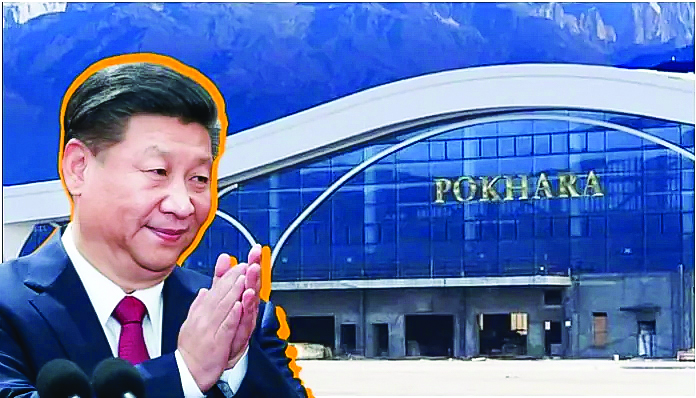NEW DELHI: It has been claimed that China’s loan to Nepal is being serviced at 5% and not 2%, as publicly claimed by China.
Chinese Ambassador to Nepal, Chen Song, has courted controversy. He is being accused of crossing the diplomatic lines after he publicly threatened a senior journalist on X (formerly Twitter) after the said journalist claimed that the loan provided by China’s Export-Import Bank to Nepal to develop the Pokhara International Airport was being serviced by Nepal at the rate of 5% and not 2% as was being publicly claimed by Chinese authorities.
Gajendra Budhathoki, who is a financial journalist of Nepal with 29 years’ experience and a strong understanding of economic issues, on 27 May tweeted in Nepali that “The loan taken for the Pokhara International Airport was said to have an interest rate of 2 percent, but it was 5 percent.”
This immediately led to a surprising knee-jerk reaction from Song, who responded to Budhathoki while calling him a liar. “Worst lie that I ever saw. It is public information, yet you dare to lie about it,” Song wrote. The journalist, in response to the ambassador, said that “I will publish an article in his magazine with proof to show the loan was actually being charged at the rate of 5 percent.”
A belligerent Song, who was posted in Nepal in February last year, then further retorted, “If you have the document, publish it. If you don’t need time to find proof, then what kind of intention is this. Spreading lies first, then waits for the tide to subside, and spread again.”
Speaking to The Sunday Guardian, Budhatoki said that as per the official documents accessed by him related to this entire project, it is clear that the Nepali government was repaying the loan at the rate of 5%, which, if read while keeping the exchange rate in mind, would come to 36%. “The loan was signed between the Nepal government and China’s Import-Export Bank for a 2% rate of interest. As per the agreement, the loan is to be served by Civil Aviation Authority of Nepal (CAAN) directly to the Chinese bank and they are doing it at the rate of 5% for the last 7 years. Apart from the interest, CAAN is also paying a ‘Management fee at the rate of 0.2%’ and ‘commitment fee’ at the rate of 0.2%.
Please keep in mind that when the loan was signed, the exchange was 86 Nepali rupees for 1 dollar and now it is 134 Nepali rupees for 1 dollar. So in reality, the Nepali government is repaying the loan at the rate of 36%,” Budhatoki told The Sunday Guardian while stating that he will publish an article on this in the coming days.
Related documents accessed by The Sunday Guardian showed that the loan was indeed being served by Nepal at the rate of 5%.
Ever since his tweets and comments to Song that he will put out all the facts in the public domain in the coming days, Budhatoki said that he has been receiving threats from
In August 2020, the dead body of Balaram Baniya, who was the Assistant Editor of Kantipur, a national vernacular daily, was found in Makawanpur district of Nepal. He had been missing for two days. Before his death, he had reported on the encroachment and salami slicing of Nepali land that China was carrying out.
This is not the first time that the Chinese ambassador has courted controversy.
Last year in September, Song was accused of betraying his responsibilities as a diplomat and speaking like a newbie politician. While addressing a discussion in Kathmandu titled, “China in the global economy and its impact in Nepal,” Song had said: “Unfortunately, you have a neighbour like India, but fortunately you have a neighbour like India, because India is a huge market, with huge potential you can tap into. But at the same time, India’s policy towards Nepal and other neighbours is not so friendly and not so beneficial to Nepal. So, we call that policy of constraints.” Pokhara airport, for which China had given a $215.96 million loan to Nepal, was finally completed and inaugurated on 1 January 2023, after a 50-year wait for the second most populous city of Nepal. However, it has failed to take off, just like many other Belt and Road Initiatives (BRI) of China across Asia.

